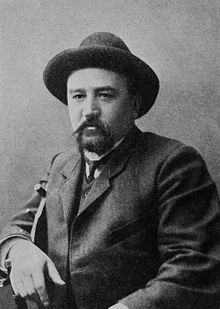Alexander Kuprin
| Aleksandr Kuprin | |
|---|---|

Kuprin
|
|
| Born | 7 September [O.S. 26 August] 1870 Narovchat, Penza Governorate, Russian Empire |
| Died | 25 August 1938 (aged 67) Leningrad, Soviet Union |
| Occupation | writer • journalist |
| Genre | short stories |
| Literary movement | Naturalism |
| Notable works | The Duel (1905), The Pit (1915) |
| Notable awards | Pushkin Prize |
|
|
|
| Signature |  |
Aleksandr Ivanovich Kuprin (Russian: Алекса́ндр Ива́нович Купри́н) (7 September [O.S. 26 August] 1870 in the village of Narovchat in the Penza Governorate – 25 August 1938 in Leningrad) was a Russian writer best known for his novels The Duel (1905) and The Pit, as well as Moloch (1896), Olesya (1898), "Junior Captain Rybnikov" (1906), "Emerald" (1907), and The Garnet Bracelet (1911), the latter made into a 1965 movie.
Alexandr Kuprin was born in Narovchat, Penza, to Ivan Ivanovich Kuprin, a government official in Penza Governorate. and Liubov Alekseyevna Kuprina, née Kulunchakova. His father was Russian, his mother belonged to a noble Volga Tatar family who had lost most of their wealth during the 19th century. Alexandr had two sisters, Sofia (1861–1922) and Zinaida (1863–1934).
In 1871 Ivan Kuprin, aged 37, died of cholera, and three years later Alexander with his mother moved into the Widows' Home in Kudrino, Moscow, a period reflected in his tale "A White Lie" (1914). In 1876 he entered the Razumovsky boarding school, which caused him a lot of what he later referred to as 'childhood grievances', but also brought about his riotous nature and made him popular among peers as fine storyteller.
In 1880, inspired by Russia's victory in the Russo-Turkish War, Kuprin enrolled into the Second Moscow Military High School, turned into the Cadet Corps in 1882. Several of Kuprin’s autobiographical stories, like "At the Turning Point" (1900), "The River of Life" (1906) and "Lenochka" (1910), refer to this period. "The memory of the birching at the Cadet Corps stayed with me for the rest of my life," he wrote not long before his death. Yet it was there that he develop an interest in literature and started to write poetry. Most of his thirty youthful poems date from 1883–1887, the four years when he was in the Cadet Corps. During this period Kuprin also made several translations of foreign verse (among them Béranger's "Les Hirondelles" and Heine's "Lorelei"). According to the scholar Nicholas Luker, "perhaps the most interesting of Kuprin's early poems is the political piece "Dreams", written on 14 April 1887, the day before sentence was passed on the terrorists who had plotted to assassinate Alexander III in March of that year."
...
Wikipedia
